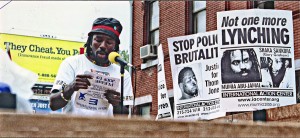Derrick Duncan: Jamaican immigrant & revolutionary
It’s tragic when a person in his 40s dies suddenly of a mysterious illness. But it’s especially tragic when he is a working-class revolutionary, a staunch unionist, an immigrant from Jamaica who yearned to visit the motherland in Africa.
Derrick Duncan met Workers World Party in 1995 at the annual Caribbean Day celebration held in Brooklyn, N.Y., during the Labor Day weekend. A flier about the fight to end the death penalty and save the life of political prisoner Mumia Abu-Jamal attracted him to the struggle. Always a fighter to end racism and police brutality, Duncan’s worldview expanded as he read Abu-Jamal’s essays about the prison-industrial complex and connected the dots to capitalism.
Both John Parker in Los Angeles and Steven Ceci in Baltimore remember the enthusiasm and dedication Duncan brought to the mobilization in Los Angeles to save Mumia’s life and end the death penalty during protests at the Democratic National Convention in 2000. “As an oppressed person, Derrick was inspired by this great revolutionary,” Ceci told Workers World.
“Derrick often made clear his opinion that lesbian and gay people must have the same rights as heterosexuals. And I’d call him a workaholic — that’s how strong his work ethic was.”
A transporter at New York-Presbyterian Hospital, Duncan was a member of 1199, the Service Employees union. Anne Pruden remembers that after he was elected a delegate in the early 2000s, Duncan joined other Workers World members and friends to distribute fliers at monthly delegate assemblies.
“Derrick had a working-class view of everything,” says John Parker. “That’s what attracted him to our politics. He was unabashedly biased in favor of the working class. And being an immigrant made him an internationalist.” Hillel Cohen, who leafleted 1199 meetings with Duncan, agrees: “Derrick’s experiences in life as a young immigrant worker won him to the struggle.”
Donatien Bukuba, born in Burundi, shared the immigrant experience with Duncan: “We were both trying to make a living, often holding two jobs. When we didn’t have jobs, we would support each other. We took the politics of Workers World and the International Action Center and applied them to ourselves — the poor must work together to support each other.”
Bukuba remembers the concern Duncan showed him at a rally demanding reparations for African Americans in Washington, D.C. a decade ago. “We were talking with a group of young, very militant Black men. Some of them wanted to confront the police. Derrick looked at me and said, ‘We don’t have green cards yet. Come over here so we don’t get arrested.’ The brother really cared for me.
“I took him to visit my family from Africa in New York. He bonded with them. He was so excited to eat African food. My family was his family. When he became a citizen two years ago, the first thing he did was bring his 14-year-old daughter Dainia here. He said, ‘Now I can do things freely and have peace of mind.’ We talked about going to Africa together this November.”
In addition to politics, Bukuba, Ceci and Duncan shared an interest in music, particularly reggae. “We wanted to take Bob Marley’s music and put it into action,” says Bukuba, who describes Duncan as very open minded. Parker remembers him as “very friendly, very sincere, very respectful, a warm person, humble and honest, who made an effort to make everyone comfortable. He had a good way of teaching — questioning and then giving his opinion.”
Born on April 5, 1968, Duncan died of a lung infection on June 10. Cohen reports that Duncan’s brother said he died from exposure to a toxic substance that injured his lungs, which never recovered. Noting that such a condition is usually associated with asbestos or radiation, Cohen speculated that such exposure could have occurred while Duncan was remodeling his house in Brooklyn.
Derrick Duncan will be remembered as an ardent working-class fighter against racism, police brutality and imperialism, particularly in Africa and the Caribbean, and for workers’ and women’s rights. Though his life was tragically cut short, Derrick’s determination to create a better world for his daughter and all the oppressed lives on. Derrick Duncan presente!


